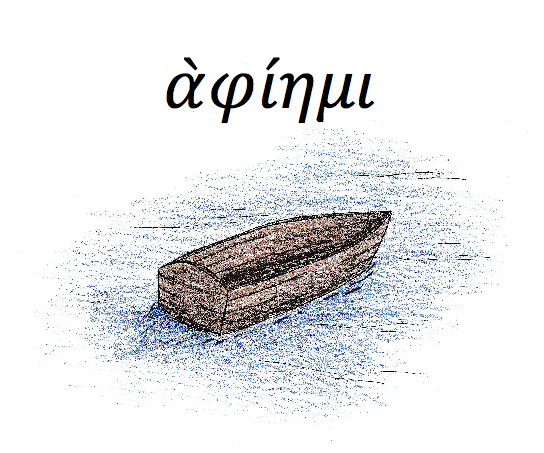My new favorite Greek word is “apheimi.” To be honest, it’s been my favorite Greek word for almost two years now. I’ve had other favorite Greek words in the past, being a mathematician, but when “apheimi” came into my vocabulary a while back, it shoved all those others way down the list. You might say I have been consumed with it.
“Apheimi” is a game-changer. It changes the forgiveness game.
You see, there are three entities involved in every forgiveness issue. First of all, there’s the offended person. That’s you. Then there’s the person who performed the offense. That’s… well, you know who they are. The third item is the offense itself. And that’s where “apheimi” becomes powerful.
There are actually two Greek words translated as “forgive” in the New Testament. It is very unfortunate – and crippling – that we only have one English word. Conjure up every example, every synonym, every image of forgiveness that you can think of. Where is the focus? What is the central idea? Does it seem complex? Difficult? Impossible?
Apheimi is the Greek word most often translated “forgive” in the New Testament. It’s really two Greek words put together. The first is “apo” and it means “away.” The second is “heimi,” and it means “to send.” When you put them together, it becomes “to send away.” You might want to stop reading for a minute and digest that thought.
Think about replacing the word “forgive” with its Greek form “apheimi” (to send away). Use it in a sentence. It will help if you concentrate on a personal example of someone who hurt you deeply in the past, so that you can get a handle on how this can work for you. Your sentence might look something like this:
“I forgave him.”
“I really need to forgive her.”
“God, I know You demand that I forgive them.”
What do these sentences have in common? The direct object is always a person. The central focus in English is always the offender. Now, replace the word “forgive” with “send away.”
“I send him away.”
“I really need to send her away.”
“God, I know you demand that I send them away.”
Umm… That’s not really working right, is it? In fact, it seems to be the opposite of our English word forgive. Although we’d probably love to “send the offender away” — to a very, very bad place — that is clearly not what forgiveness is.
So what could the implications of “sending away” actually be? Let’s look at the three entities I mentioned earlier. There’s only one other thing we could be sending away, and that’s the offense itself. The beauty of this metaphor for forgiveness is that it only involves two of the three: me, and the offense. I can accomplish this without any reference to, and without any involvement with, the offender.
When I send away the offense, I deal with what the action against me has produced in me. How has it changed me? How has it altered my opinion of myself? Has it altered my behavior and my thought patterns? Has it changed the future I thought was before me? Has it robbed me of the ability to see myself having a good life, good relationships, good health? When I send the offense away from myself, I open myself up to the belief that life can still be good, I can still have a positive influence on my world, and God’s plans for me have not changed. Emanuel, “God with Us,” is still with ME, no matter what has been done to me or inflicted upon me.
Perhaps this still sounds hard, even impossible, but to me it seems a whole lot more possible than reconciling with an offender that I continue to believe has ruined my whole life. Once I have dealt with what the offense has produced in me (wrong beliefs about myself, God, or my future), then I am free to move on to deal with the offender in a way that is both wise and loving. It may be that once I have sent away the offense, there is nothing more that needs to be done. I may actually see the entire event differently than I did before, and this alone may be enough.
One thing that becomes much more clear after this “sending away” occurs is how to proceed as regards the offender. Without the baggage that the offense has produced in my own heart, I can begin the search for possibilities. Is the offender someone I want to have a relationship with? Is the offender someone God wants me to have involved in my life? Is the offender someone I need to place outside of my circle in ways that protect me and allow me to heal and grow? Can a professional counselor help me work through the decisions I must make about this issue? Are there friends who can help me sort all of this out?
These are questions that involve that other Greek word for forgiveness, and I will have more to say about it in the future. For now, I am still celebrating the fact that forgiveness can be broken down into steps, and the first one (sending the offense away from myself) is, in my experience, very liberating. Try it and let me know how it goes. I will be praying for you!

